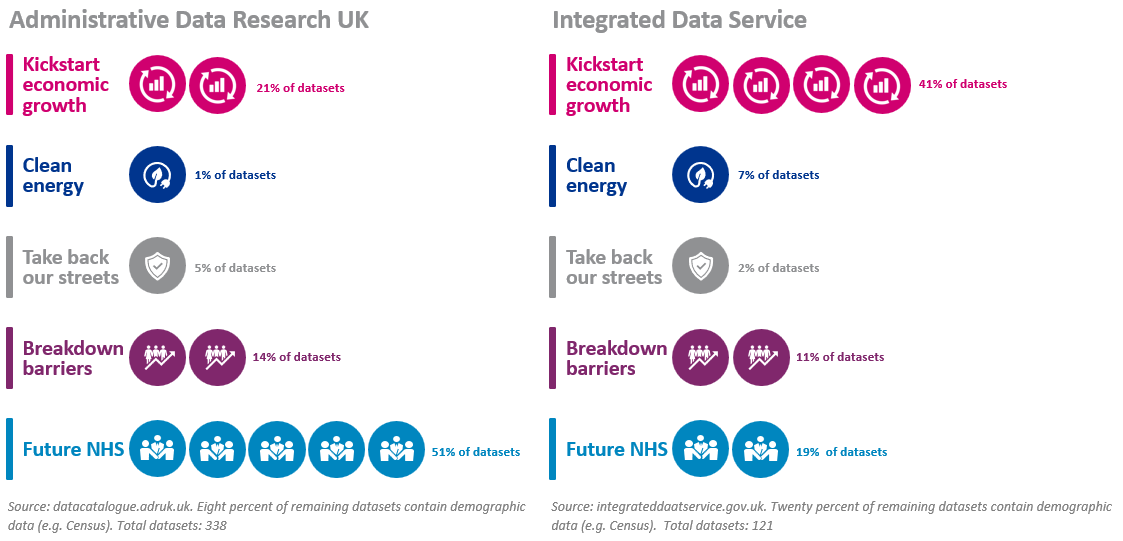
The National Data Library: building the foundations of the UK’s data infrastructure
The ambition of the National Data Library is to lay the foundations of the UK’s future data infrastructure. To do this, the NDL needs to consolidate the current fragmented ecosystems and to put forward a clear case of its benefits for the UK economy and society.
5 min read 9 February 2025
The ambition behind the National Data Library
Although we do not know enough yet about the features of the National Data Library (NDL), we can expect the government to want to extend access to public sector data beyond researchers. If the NDL went for its most ambitious applications, it would need to make 'AI-ready' data available to both public and private sector organisations, including for some commercial uses.
What we have learned from previous efforts
A recent evaluation of an existing data platform has shown that investing in data linkage across public sources can deliver £5 of benefits for every £1 of costs.1 At the same time, the level of investment in data platforms across the public sector has also been substantial. Baringa’s own analysis shows that the government has spent at least £320m during the past 5 years across its two flagship data platforms2, in addition to over £180m spent on health platforms such as the NHS Secure Data Environments and OpenSafely3, and £330m set aside for the NHS’s Federated Data Platform over seven years.4 While these are wise investments that can translate into real benefits for the UK, there needs to be a more cohesive approach to tracking and communicating the benefits of this investment at a time of pressure on public spending.
Broadening the NDL use cases beyond research is likely to yield similar, if not higher, return on investment. Yet past attempts to broaden the application beyond academic research have met with a few obstacles:
- The Government’s own assessment of past efforts concluded that research and operational use cases will need multiple platforms and products5, going beyond the current model of pre-linked, anonymised data assets accessed in a secure research environment.
- The Digital Economy Act (DEA) has enabled more than one hundred data sharing pilots across over eighty public sector bodies, creating over £135m worth of savings to taxpayers.6 Yet, risk aversion and different maturity levels remain significant barriers.
- Public acceptability of data use by government remains an issue. However, a survey of 29,000 UK residents found widespread support to share personal data for research, and even some support for sharing data with profit-making companies involved in developing medical treatments.7
How to make the NDL a success
If done right, the NDL can lay the foundation of the UK’s data infrastructure for decades to come. The size, complexity, and multi-stakeholder nature of this ambition, coupled with the intangible nature of its benefits, can make such a programme daunting. For this reason, it is important to set up the right construct for the NDL from the onset. Baringa has partnered with various public sector bodies to help implement digital and data transformation, addressing complex programme, technology, and procurement challenges. It is this experience that has helped us distil these critical success factors for the NDL.
Next steps…
- Treat the NDL as an opportunity to build sustainable public sector data infrastructure.
- Continue engagement with the public: especially communicate more about the benefits to individuals, society, and the economy.
- Focus on where the NDL can make a difference – even if it means sacrificing breadth of use cases in favour of impact.
How can we help?
At Baringa we worked with organisations across all sectors, including government, to build scalable and sustainable data platforms and programmes. To find out more about our work in this space, you can get in touch with our experts, or read about how we have supported NHS England to build their data backbone to unlock better services and care for people.
1. https://www.adruk.org/news-publications/news-blogs/evaluation-finds-adr-uk-is-a-beneficial-data-linkage-investment-returning-significant-value-to-government-and-researchers/
2. This includes £240m for the Integrated Data Service (IDS) for the period 2020-21 to 2024-25 (source: https://www.ons.gov.uk/aboutus/transparencyandgovernance/freedomofinformationfoi/committedinvestmentandspendfortheintegrateddataprogramme#:~:text=For%20the%20financial%20years%202020,is%20approximately%20%C2%A355%20million) and £84m for Administrative Research UK (ADR – UK) for the period 2021/2022 – FY2024/2025 (source Interim_evaluation_of_ADR_UK_-_Summary_report__Nov_2024.pdf)
3. https://www.hdruk.ac.uk/helping-with-health-data/the-sudlow-review/
4. https://www.england.nhs.uk/digitaltechnology/nhs-federated-data-platform/fdp-faqs/
5. https://www.gov.uk/service-standard-reports/data-marketplace-alpha-assessment#what-the-team-has-done-well
6. https://www.gov.uk/government/news/new-data-sharing-powers-save-taxpayers-137-million-since-introduction
7. https://understandingpatientdata.org.uk/sites/default/files/2024-09/Public%20Attitudes%202021-2024.pdf
8. https://www.gov.uk/government/publications/ministry-of-justice-better-outcomes-through-linked-data-bold/ministry-of-justice-better-outcomes-through-linked-data-bold#data-and-analysis-pilot-projects
9. https://wellcome.org/what-we-do/our-work/uk-data-library
10. https://www.gov.uk/government/publications/state-of-digital-government-review
11. https://www.baringa.com/en/impact/case-studies/nhs-england-technology-procurement/
Our Experts



Related Insights

Your people are key to unlocking the backlog burden
Dealing with crises will always be part of the Government’s DNA – its ability to adapt rapidly and act with agility is vital. How do we address the root causes of problems to prevent them recurring and worsening backlogs further?
Read more
Departments must not obsess over ‘input measures’ when developing productivity plans – especially when it comes to tracking time
Government organisations need to be mindful of the cost they are creating around input measures.
Read more
Delivering an independent evaluation for the NSW Advocate for Children and Young People
An independent evaluation of the NSW Strategic Plan for Children and Young People 2022–2024 was conducted to assess its impact and support future planning.
Read more
Driving the digital shift in health: what to watch in the 10-year health plan
At the heart of the 10-Year Health Plan lies a decisive shift from analogue to digital, putting power in patients’ hands, enabling a shift to the Neighbourhood Health Service and moving from centralised control to empowered front-line delivery. These changes are not just strategic - they are essential.
Read moreIs digital and AI delivering what your business needs?
Digital and AI can solve your toughest challenges and elevate your business performance. But success isn’t always straightforward. Where can you unlock opportunity? And what does it take to set the foundation for lasting success?
